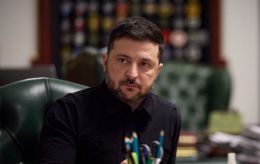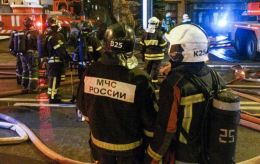Kursk breakthrough: Why Sudzha 'gas valve' is important and what can threaten nuclear power plant
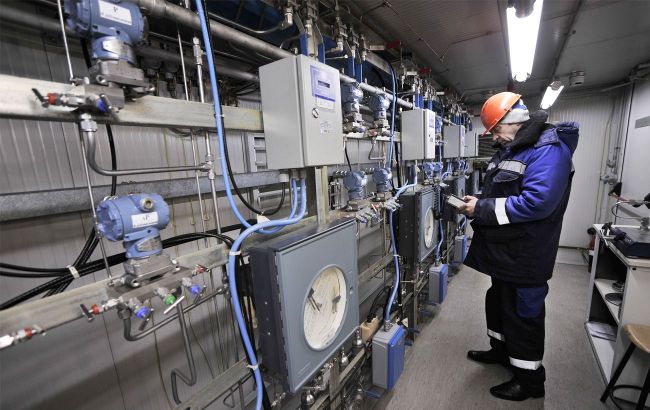 Photo: Russia may have lost control of the Sudzha gas metering station in the Kursk region (Getty Images)
Photo: Russia may have lost control of the Sudzha gas metering station in the Kursk region (Getty Images)
Fighting in the Kursk region has led to Russia losing control of the Sudzha gas metering station (GMS). This is the only entry point into Ukraine's gas transportation system through which Russian gas is transited to Europe.
For more details on what is happening and whether there is a risk of early termination of the transit, see the RBC-Ukraine material.
Contents
- What is happening at Sudzha GMS
- What exactly is this object
- What’s going on with Russian gas transit through Ukraine
- Gas prices in the European market
- Next target – Kursk Nuclear Power Plant?
What is happening at Sudzha GMS
The first report of the loss of control over the Sudzha station came on August 7 from the pro-war Telegram channel Rybar, which is close to the Russian Ministry of Defense. Later that evening, the information was confirmed by documentary evidence from the Kursk region.
The facility itself is located just a few hundred meters from the eponymous border checkpoint. According to a map from the Institute for the Study of War (ISW), based on geolocated footage, the Russian side does not control the territory for tens of kilometers inland.
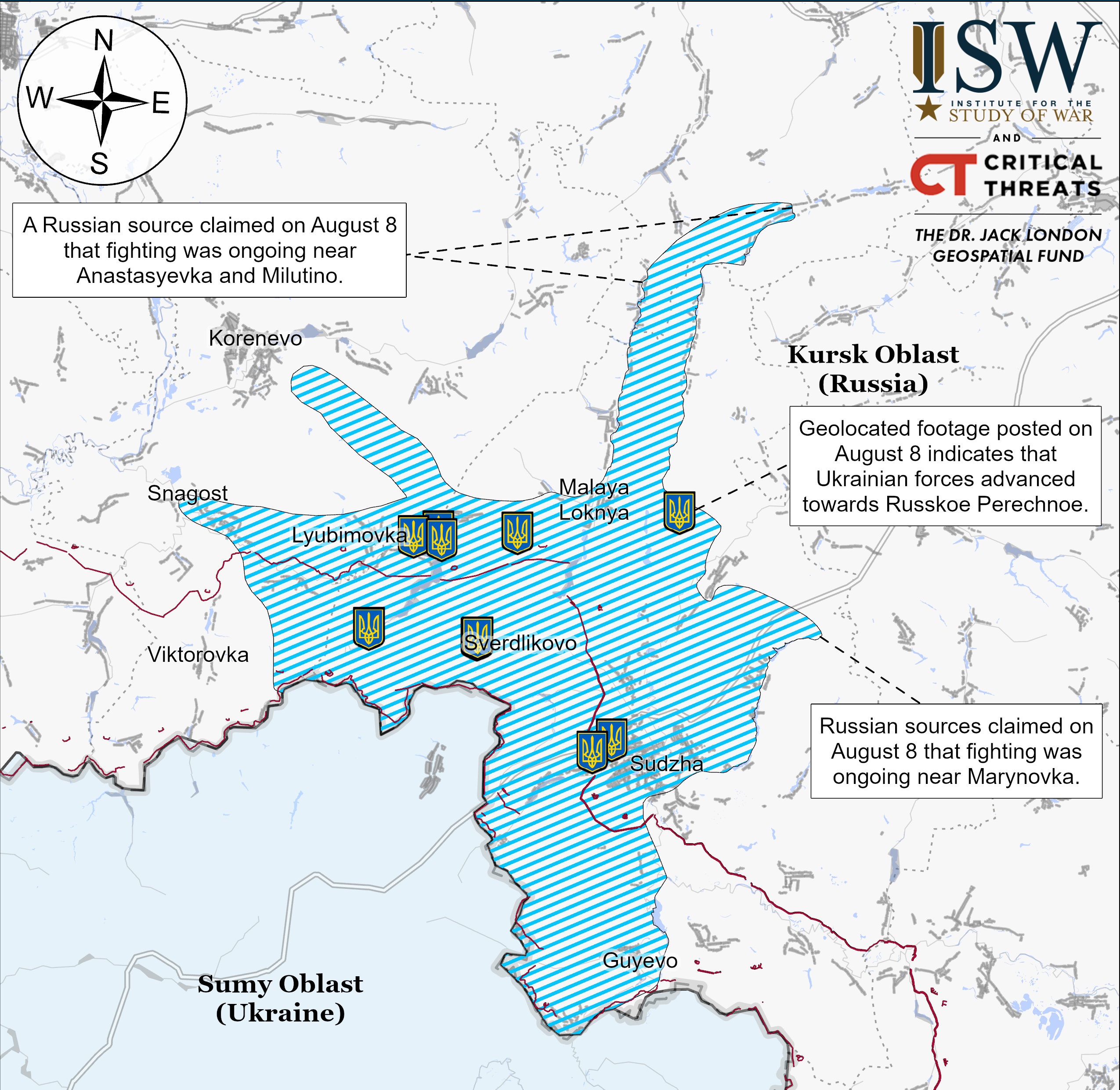
Photo: According to ISW maps, the area around the Sudzha station is not controlled by Russia (understandingwar.org)
On the eve, an anonymous advisor to President Volodymyr Zelenskyy confirmed to The Washington Post the activity of Ukrainian forces on Russian territory and the capture of an area of about 100 square kilometers. "In three days, the Zelenskyy adviser said, Ukrainian personnel advanced past towns of thousands of people, took hundreds of prisoners, and captured a gas metering station that Russia uses for energy transactions with Hungary and Slovakia," writes WP.
The Center for Information Resilience (CIR), a British analytical non-profit organization, highlights significant damage to the border checkpoint. However, it cannot visually assess the damage to the Sudzha gas metering station.
"This, combined with footage verified by CIR of several Russian soldiers surrendering to Ukrainian soldiers near the entrance of the gas metering plant, makes it likely that the plant has been affected by the Ukrainian incursion, however, the level of damage cannot be verified at this time," the analysts concluded for Reuters.
Officially, neither the Ukrainian military nor the authorities have announced control over Sudzha or any other details of the operation in the Kursk region.
From a military perspective, control over the gas station is of no significance, according to an expert and former spokesperson for the General Staff of the Armed Forces of Ukraine, Vladyslav Seleznov. He argues that it creates threats to the transit of Russian gas, for which Ukraine receives funds that cover the costs of maintaining the entire gas transportation system. According to him, the Ukrainian army is unlikely to act in a way to blackmail the Russians with a "gas valve."
"This story should be considered more from an emotional-political perspective. The Russians are beginning to realize that the war is not somewhere out there but on their own territory. Although, the fact that a military column was destroyed near a settlement with the picturesque name Mazepino raises questions about whether the Kursk region is truly Russian land in a historical context," he ironically remarks.
What exactly is this object
The Urengoy-Pomary-Uzhgorod main gas pipeline runs through the Sudzha station. This is the key and only operational route for the transit of Russian gas to European Union countries via Ukraine.
In fact, the Sudzha gas distribution station is a border point for gas from Russia. Passing through it, the fuel enters the Ukrainian gas transport system, then to Slovakia, Czechia, and Austria. Last year, about 14.65 billion cubic meters were pumped through the station, which is almost half of all Russian gas exports to Europe.
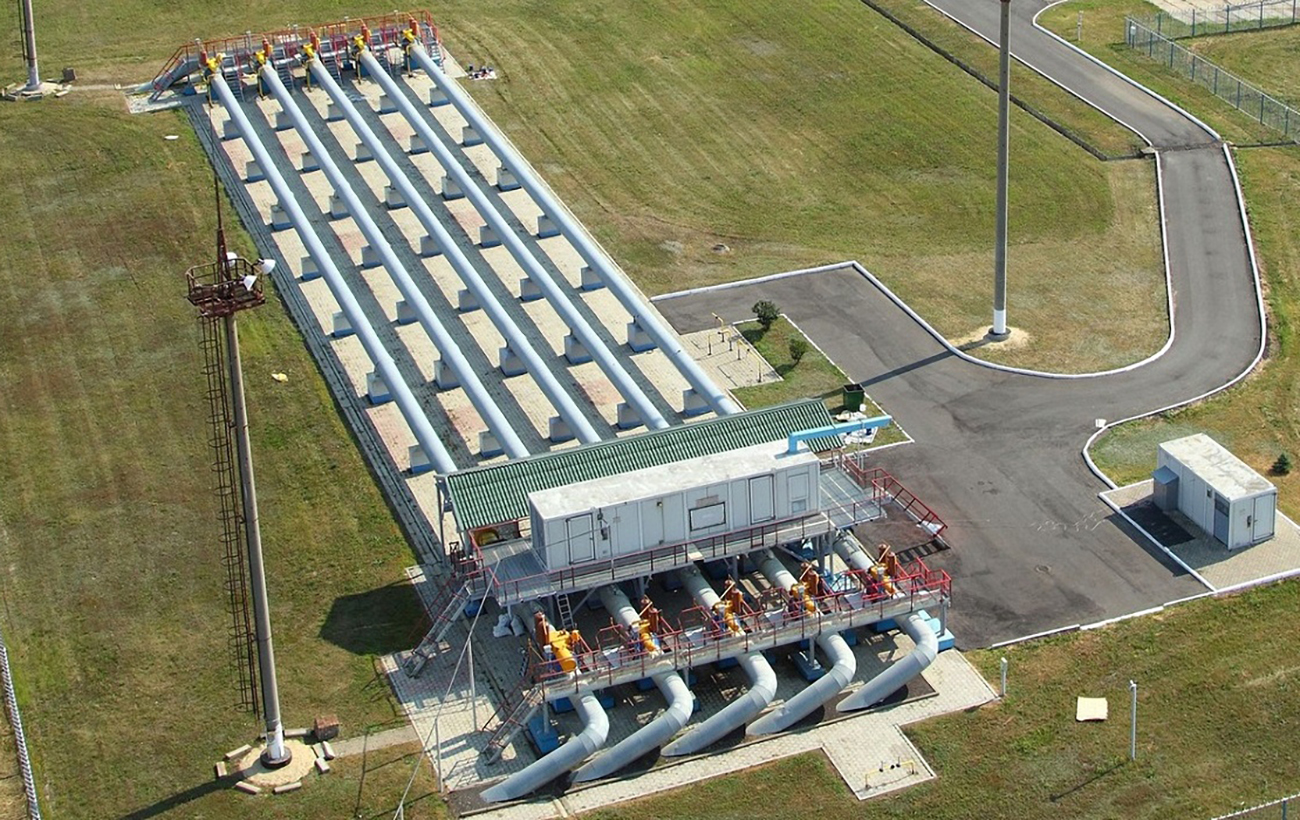
Photo: Sudzha gas metering station (Getty Images)
The main function of the gas metering station is to account for gas consumption and measure quality indicators. It is possible that losing control over the Sudzha station could lead to the cessation of supplies by Gazprom.
For example, as was the case with Ukraine in May 2022. At that time, against the backdrop of Russian advances in Luhansk, force majeure was declared. The company Ukrtransgaz stopped transit due to the loss of operational control over the Novopskov compressor station, which received gas from the Sudzha gas distribution station in Russia's Rostov region.
Ukraine is dealing with an enemy that can act completely irrationally. Therefore, it cannot be ruled out that Russia might decide to halt transit prematurely, according to Volodymyr Omelchenko, Director of Energy Programs at the Razumkov Centre.
"I see no grounds or benefits for Ukraine if 'unknown armed formations' were to shut off the valve at Sudzha. I believe this is all speculation. Why would they do this when Ukraine could have shut off the valve at its own gas transport system earlier if it wanted? At the request of Europeans, it did not do so because some partners could not immediately ensure the diversification of gas supplies," he said in an interview with RBC-Ukraine.
What’s going on with Russian gas transit through Ukraine
Despite the events in the Kursk region, the transit through Ukraine is proceeding as usual.
"Gas transportation to European customers is continuing as scheduled, without changes. Nominations are confirmed, and the physical flow of gas is maintained," reported the Gas Transmission System Operator in a comment to RBC-Ukraine on August 7.
Energy Minister Herman Halushchenko confirmed the operation of the gas corridor. According to him, the Russian side has not contacted Ukraine regarding the transit situation, writes Reuters. According to the agency, Russian Gazprom does not plan to halt supplies. Although up to 42 billion cubic meters per day were previously transported through Sudzha (as part of the annual delivery obligation of 14 billion cubic meters), a slight decrease in volumes is now noted.
As Gazprom representative Sergey Kupriyanov stated, the nomination for Wednesday was 39.4 million cubic meters, and for Thursday, 37.3 million, which is 12% lower than the usual level. On Friday, supplies are expected to increase to 38.5 million cubic meters. According to hourly data from the European information platform ENTSOG, the physical flow at the exit from Ukraine remains continuous, and transit may increase on Friday.
Additionally, ENTSOG data showed a slight decrease in the flow of Russian gas by 5-10% as early as the morning of August 6. This may be related to a gradual reduction in demand for fuel in Europe. Specifically, a heatwave had recently passed, reducing the activity of air conditioners and ventilation systems.
Today, the Gas Transmission System Operator again stated that transit is proceeding as scheduled, nominations are confirmed, and the gas flow to European customers is maintained. Gazprom, for the first time commenting on the events in the Kursk region, noted that they supposedly caused a spike in exchange prices.
Gazprom is not halting supplies because it is extremely disadvantageous for them. After the full-scale invasion of Ukraine, they lost 90% of the EU market, where they were the main supplier. Today, they are forced to receive budget support amounting to hundreds of billions of rubles, explains Omelchenko.
"Losing the supply route through Ukraine to Slovakia, Czechia, and Austria would cost Gazprom about 6 billion euros. The situation would become absolutely catastrophic: they would have to stop production, freeze wells, which entails significant economic losses. Russia's options are limited—either halt exports, lose wells in Western Siberia and incur enormous costs, or continue supplies," says the expert.
At the same time, he believes it is possible that the Russian side might reduce the amount of gas transported and also accuse Ukraine of allegedly seizing the Sudzha gas distribution station and shutting off the valve, claiming that this prevents Gazprom from fulfilling its contractual obligations in full.
“To make Europe push for the operation in the Kursk region to stop. I think such an IPSG (Information Psychological Special Operation) could be played out by the Kremlin,” he added.
Gas prices in the European market
Although the section of the pipeline not under Russian control remains untouched, the latest escalation has made the European market nervous.
According to Bloomberg, gas futures reacted by rising 2.6% to 39 euros per MWh, reaching their highest level since December 2023. In two days, prices at the TTF hub increased to 40.1 euros per MWh.
The contract for the transit of Russian gas through Ukraine expires in 2024, but an early halt in supplies would be a shock, as some Central European countries still depend on the Ukrainian route.
At the moment, it's difficult to predict what will happen with prices. As VolodymyrOmelchenko explains, on one hand, Ukraine guarantees supplies according to the contract, while on the other hand, the Kremlin could order a halt.
Political statements are already coming in. Former Slovakian Economy Minister Karel Hirman recently suggested that the fighting in the Kursk region threatens to disrupt transit. "Russian gas supplies are noticeably decreasing. My warning that Russian gas supplies through Ukraine to Slovakia are under serious threat is being confirmed," he wrote on Facebook.
However, if there are threats, they are not coming from Ukraine, believes Omelchenko.
"In my opinion, there are no such threats from our side. But, of course, we don't know what Kremlin strategists might come up with," added the expert.
Next target – Kursk Nuclear Power Plant?
In addition to the gas metering station, there are other important facilities in the Sudzha district, including a 330 kV substation that previously connected the Kursk Nuclear Power Plant with the Ukrainian energy system, as well as a line from the plant to the Belgorod region.
During the operation, there were reports of explosions in Kurchatov, where the nuclear power plant is located. According to Acting Governor Andriy Smirnov, two missiles were allegedly shot down in the area.
As of the morning of August 9, according to the Russian media resource Important Stories, the combat zone has stretched over 800 square kilometers. Telegram channels in panic report that Ukrainian forces might advance from Sudzha towards Kurchatov. The distance from Kurchatov to the nearest combat area is about 50 km, or approximately 30 km according to other sources.
The current raid on Kursk is shrouded in strong secrecy, even by the standards of "fog of war." The Economist, citing a source in the General Staff of the Ukrainian Armed Forces, reports that taking control of the Kursk Nuclear Power Plant in response to the capture of the Zaporizhzhia Nuclear Power Plant in Enerhodar is considered unlikely, as it would require larger forces and an 80 km march into Russian territory. "Without a properly organized force, you’ll repeat the mistakes the Russians made north of Kyiv in 2022. We cut off their lines and they were easy prey," The Economist quotes.
Omelchenko sees no logic in Ukrainian control over the Kursk NPP.
"In my view, there are more foreign policy risks than advantages here. How will it be maintained, and who will do it? It’s unknown. We can’t replicate what Russian terrorists are doing at our Zaporizhzhia NPP. In my opinion, the main plan is the strategy of uncertainty: so the enemy does not know what the next steps will be. Will they block the valve at Sudzha or seize the Kursk NPP? From the front line to all dangerous directions," emphasized the interlocutor.
Military expert Vladyslav Seleznov doubts that Ukrainian forces will attempt to control the Sudzha GMS or the Kursk NPP. The main mission lies elsewhere.
"It is aimed at creating the most uncomfortable conditions, forcing Russia to divert its already limited resources from our south or east, and easing the pressure on our Vovchansk. Our army’s actions are highly effective. And regarding the interaction of aviation, air defense systems, and artillery, the work is flawless," he added.
Sources: information from Russian Telegram channels, materials from The Washington Post, Reuters, Bloomberg, and The Economist, statements from Gazprom and Ukraine's Gas Transport Operator, and comments from energy expert Volodymyr Omelchenko and military expert Vladyslav Seleznov.
